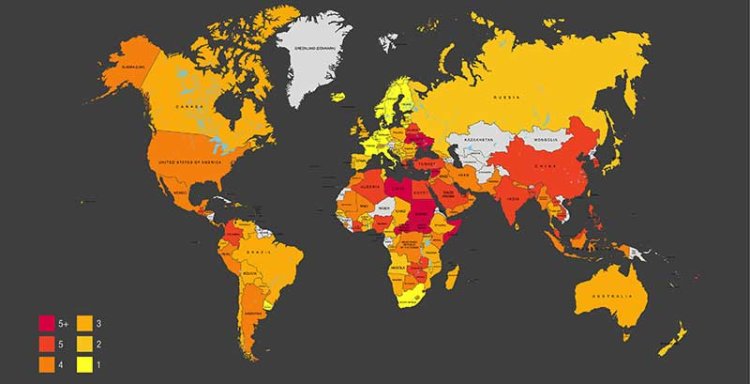“Countries such as Denmark and Uruguay led the way through their strong labour laws, but perhaps surprisingly, the likes of Greece, the United States and Hong Kong, lagged behind,” said ITUC general secretary Sharan Burrow. “A country’s level of development proved to be a poor indicator of whether it respected basic rights to bargain collectively, strike for decent conditions, or simply join a union at all.”
The International Trade Union Confederation has been collecting data on the abuse of trade union rights around the world for the past 30 years. Now for the first time the ITUC Global Rights Index presents carefully verified information from the last 12 months in an easy-to-use format so that every government and business can see how their laws and supply chains stack up.
Cambodia’s labour law fails to cover many civil servants, there are undue restrictions on the right to elect union representatives, and in 2013 the government responded with lethal force to demonstrators seeking a decent wage and working conditions. This resulted in Cambodia receiving a score of 5 in the Rights Index – the worst possible rating other than for those countries where the rule of law has completely broken down.
In the Middle East, Qatar is yet to allow unions at all for its many migrant workers, while in Latin America, Guatemala was one of the worst places to be a worker, with no guarantee of rights.
Key findings:
- In the past year, governments of at least 35 countries have arrested or imprisoned workers as a tactic to resist demands for democratic rights, decent wages, safer working conditions and secure jobs.
- In at least 9 countries murder and disappearance of workers were commonly used to intimidate workers.
- Workers in at least 53 countries have been dismissed or suspended for attempting to negotiate better working conditions.
- Laws and practices in at least 87 countries exclude certain type of workers from the right to strike.
At a time when corporate power has never been greater, these results show that almost every country can improve its treatment of workers. Only Denmark received a perfect score of zero for respecting all 97 indicators of workers’ fundamental rights.
The ITUC Global Poll 2014 found almost two-thirds of people want governments to do more to tame corporate power.
“The World Bank’s recent Doing Business report naively subscribed to the view that reducing labour standards is something governments should aspire to,” Sharan Burrow said. “This new Rights Index puts governments and employers on notice that unions around the world will stand together in solidarity to ensure basic rights at work.”
The ITUC Global Rights Index rates countries from one to five according to 97 indicators, with an overall score placing countries in one to five rankings.
1 – Irregular violations of rights: 18 countries including Denmark and Uruguay
2 – Repeated violations of rights: 26 countries including Japan and Switzerland
3 – Regular violations of rights: 33 countries including Chile and Ghana
4 – Systematic violations of rights: 30 countries including Kenya and the USA
5 – No guarantee of rights: 24 countries including Belarus, Bangladesh and Qatar
5+ - No guarantee of rights due to breakdown of the rule of law: 8 countries including Central African Republic and Somalia.
Ends
Read the report – ITUC Global Rights Index: The worst places in the world for workers
Video - http://www.ituc-csi.org/ituc-global-rights-index-the-world
For more information contact [email protected] +32 479 06 41 63


